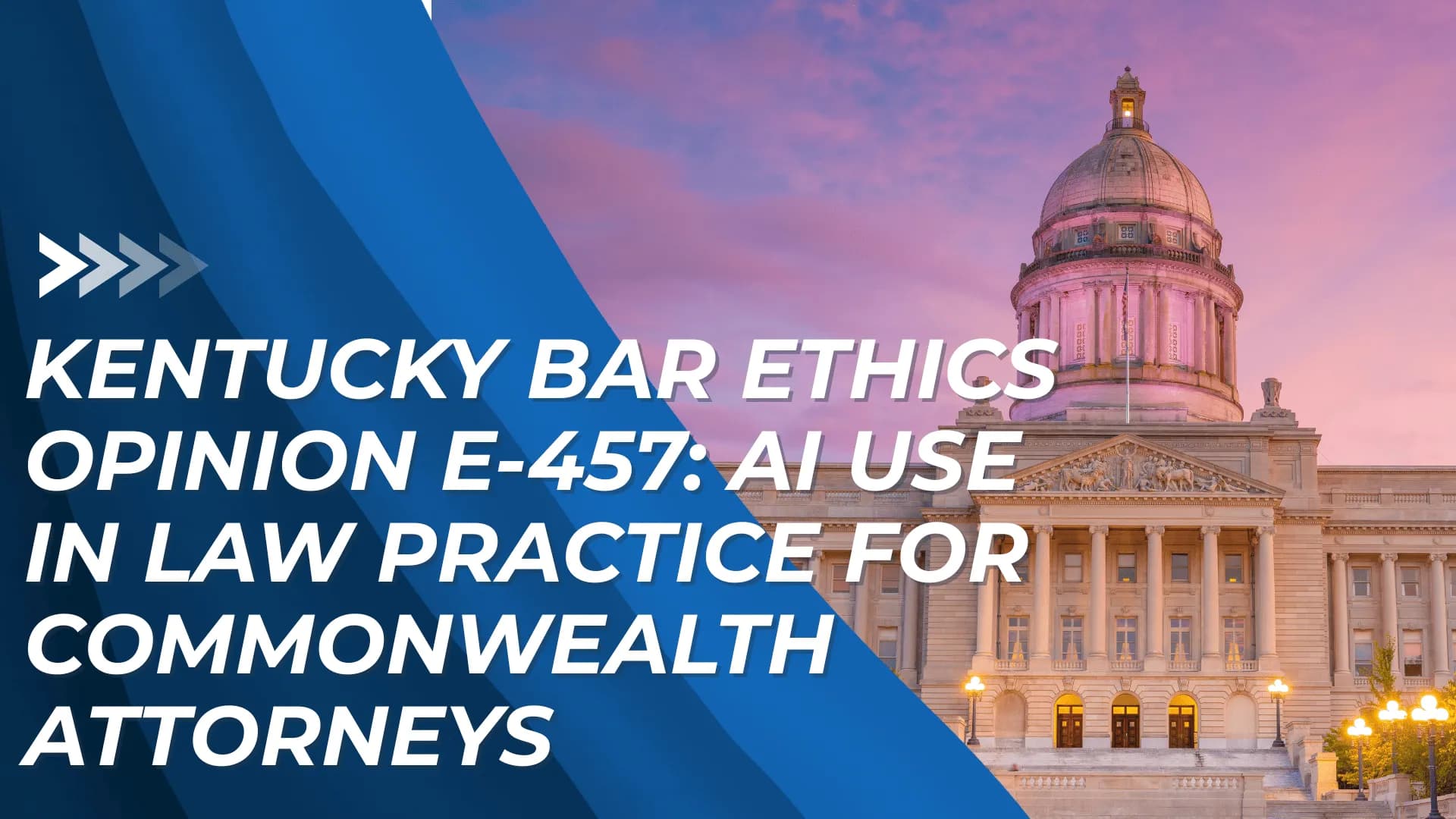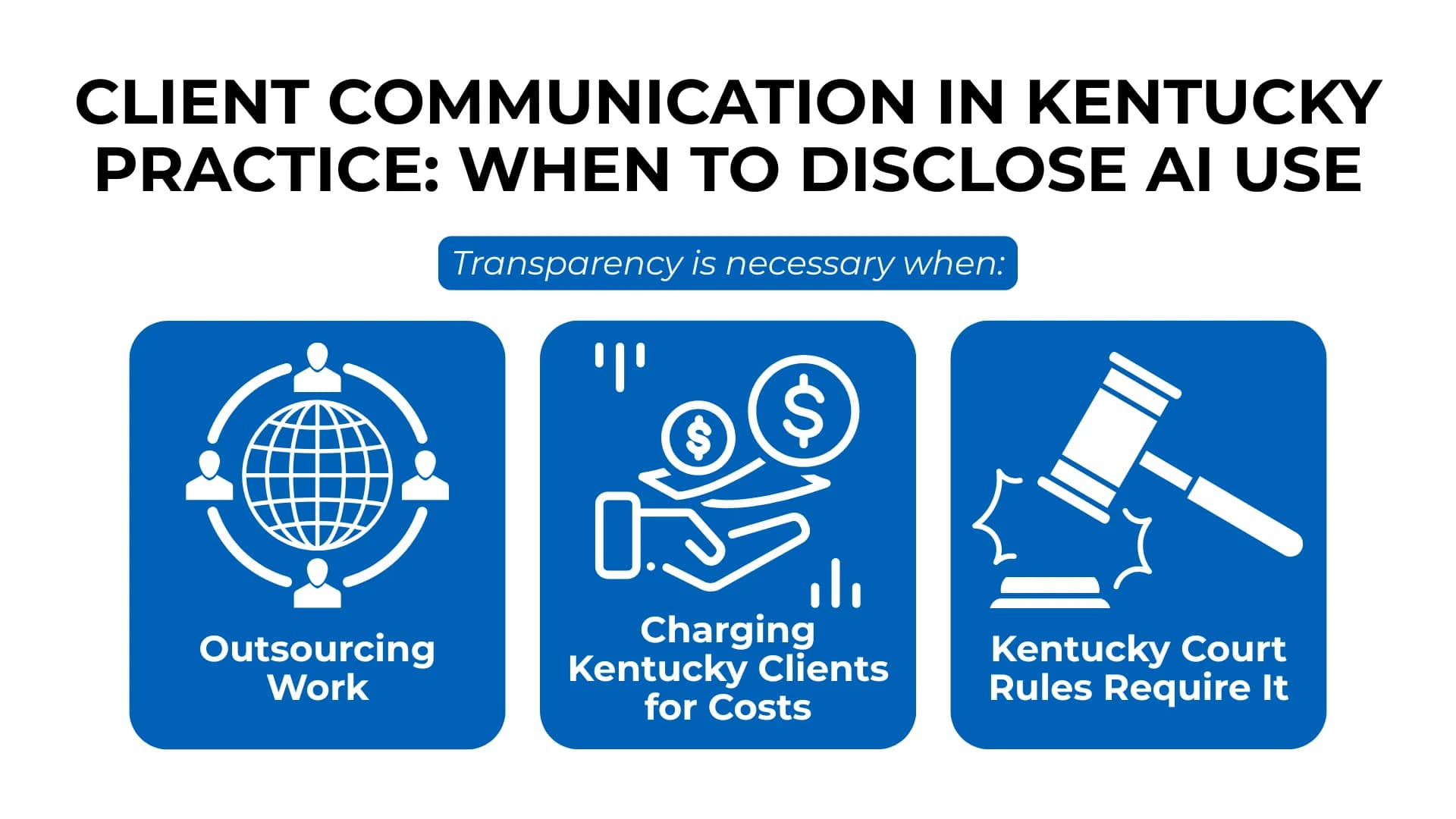Kentucky Bar Ethics Opinion E-457: AI Use in Law Practice for Commonwealth Attorneys


Introduction: A Game-Changer for Kentucky Small Firm Attorneys
AI is revolutionizing legal practice in Kentucky, offering small firm attorneys powerful tools to boost efficiency and client service. The Kentucky Bar Association's March 2024 Ethics Opinion E-457 provides essential guidance on ethical AI use for Commonwealth practitioners. For solo and small firms without dedicated ethics resources, understanding these requirements is crucial to avoid disciplinary issues while harnessing AI's advantages.
This guide distills E-457's key components into actionable strategies for ethically implementing AI in your Bluegrass State practice, without requiring extensive technical expertise.

Understanding Kentucky's Key Ethics Requirements
The Kentucky Bar Association's Ethics Opinion E-457 addresses seven critical questions about AI use in Kentucky legal practice, applying existing ethical duties to this emerging technology. Key obligations for Commonwealth attorneys include:
- Kentucky Competence Standard: Attorneys must stay informed about AI, understanding its capabilities and limitations (SCR 3.130(1.1))
- Client Disclosure in Kentucky Practice: Transparency with Kentucky clients about AI use when appropriate (SCR 3.130(1.4))
- Kentucky Fee Considerations: Adjusting fees when AI reduces attorney time and effort (SCR 3.130(1.5))
- Kentucky Confidentiality Requirements: Safeguarding client information when using AI tools (SCR 3.130(1.6))
- Accuracy Verification for Kentucky Courts: Ensuring AI-generated content is factually and legally correct (SCR 3.130(3.3))
- Kentucky Firm Management: Establishing appropriate AI policies and procedures (SCR 3.130(5.1))
Kentucky's E-457 balances innovation with professional responsibility, allowing Commonwealth attorneys to ethically harness AI's benefits while protecting client interests.

Kentucky Competence: Learning AI Basics for Your Commonwealth Practice
Under Kentucky's SCR 3.130(1.1), attorneys must maintain competence, including understanding "the benefits and risks associated with relevant technology." To ethically use AI in your Kentucky small firm:
- Start small with Kentucky matters: Begin with low-risk applications like basic Kentucky legal research or drafting routine correspondence
- Create a Kentucky-focused learning plan: Dedicate 30 minutes weekly to exploring AI capabilities relevant to your Commonwealth practice
- Attend Kentucky CLE programs: Look for Kentucky Bar Association programs specifically focused on AI ethics
- Join Kentucky practice-specific groups: Connect with other small firm attorneys using AI in similar practice areas across the Commonwealth
- Develop Kentucky verification habits: Create checklists for reviewing AI-generated content before submission to Kentucky clients or courts
Kentucky attorneys seeking to fulfill this proactive duty to understand AI technology can benefit from tools like Clearbrief's Add Fact Cite feature, which helps lawyers better understand how AI can substantiate factual assertions through evidence linking. By working with such specialized legal AI tools, Commonwealth practitioners can develop their technological competence in a practice-focused way that directly benefits clients, meeting the forward-looking skill development requirement in E-457 Question #1 (SCR 3.130(1.1)).
While Chief Justice Roberts advises that “any use of AI requires caution and humility,” this doesn't mean avoiding AI is the answer. Clearbrief enables Kentucky attorneys to embrace AI responsibly, balancing innovation with the prudence Roberts recommends.

Client Communication in Kentucky Practice: When to Disclose AI Use
Kentucky's E-457 clarifies that routine AI use doesn't always require client disclosure, but transparency is necessary when:
- Outsourcing work: If AI work is performed by third-party providers outside your Kentucky firm
- Charging Kentucky clients for costs: When clients are billed for AI-related expenses
- Kentucky court rules require it: If Commonwealth jurisdictions mandate disclosure of AI use in filings
To maintain strong client relationships in your Kentucky practice:
- Document your approach: Include AI policies in engagement letters to Kentucky clients
- Explain benefits to Commonwealth clients: Help Kentucky clients understand how AI improves service delivery
- Address Kentucky-specific concerns: Be prepared to explain your verification processes
- Obtain informed consent under Kentucky rules: Get written permission when sharing confidential information with third-party AI providers
- Follow Kentucky client preferences: Document any client restrictions on AI use

Fee and Billing Considerations for Kentucky Attorneys
Kentucky's E-457 clearly states that attorneys must consider reducing fees when AI decreases their time and effort. To ensure compliance with Kentucky's SCR 3.130(1.5):
- Bill only for actual work: Never charge Kentucky clients for hours saved through AI efficiency
- Treat learning time as overhead: Don't bill Commonwealth clients while you learn AI tools
- Obtain written consent for expenses under Kentucky rules: Get client agreement before charging for AI costs
- Distinguish overhead from billable costs: General AI subscriptions are overhead; case-specific AI services may be billable with Kentucky client consent
- Consider value-based billing for Kentucky matters: Explore flat fees for AI-assisted routine matters

Protecting Confidentiality with AI Tools in Kentucky Practice
Safeguarding client information when using AI is critical under Kentucky's SCR 3.130(1.6). Practical measures include:
- Review terms of service: Understand how AI providers handle Commonwealth clients' data
- Choose legal-specific tools for Kentucky matters: Use AI platforms designed for attorneys with appropriate confidentiality protections
- Sanitize sensitive Kentucky client information: Remove identifying details when using generative AI tools
- Consider location options for Commonwealth data: Explore on-premises or private cloud AI solutions for sensitive Kentucky matters
- Document your Kentucky compliance precautions: Keep records of steps taken to protect confidentiality under Commonwealth standards
Clearbrief's Security Features, with SOC 2 Type 2 certification and robust data hygiene controls, directly support this ethical requirement under E-457 Question #5 (SCR 3.130(1.6)). Kentucky attorneys can draft and analyze documents with confidence that client data remains secure, addressing the specific concern in E-457 about AI's potential to expose sensitive client information through external processing.

Verifying AI Output Accuracy for Kentucky Court Submissions
Under Kentucky's SCR 3.130(3.3), attorneys must ensure the accuracy of all court submissions, including AI-generated content. Practical verification steps for Commonwealth practitioners include:
- Check every Kentucky citation: Verify all AI-generated legal authorities are accurate and exist
- Review factual assertions: Confirm all factual claims are supported by evidence acceptable in Kentucky courts
- Document verification steps: Maintain records of your review process for Kentucky matters
- Create Kentucky filing checklists: Develop systematic procedures for reviewing AI-generated documents
- Stay informed about Kentucky court rules: Monitor Commonwealth jurisdiction-specific requirements for AI disclosure
Clearbrief's Mistake Detection feature directly addresses this crucial ethical duty under E-457 Question #6 (SCR 3.130(3.3)) by flagging discrepancies between drafts and source materials. This helps Kentucky attorneys prevent submission of false information to Commonwealth courts—particularly important given the Mata vs. Avianca case referenced in E-457, where attorneys faced sanctions for submitting AI-generated false citations.
Kentucky practitioners can also leverage Clearbrief's Add Fact Cite feature to streamline citation of evidence in pleadings, helping ensure all factual assertions are properly substantiated and reducing the risk of AI "hallucinations" in court filings.

Implementing AI Policies in Your Kentucky Small Firm
Even solo practitioners in Kentucky should establish basic AI policies under SCR 3.130(5.1). Simple approaches for Commonwealth attorneys include:
- Create a one-page Kentucky AI guideline: Develop straightforward protocols for your Commonwealth practice
- Document approved tools for Kentucky matters: Maintain a list of vetted AI platforms
- Establish verification procedures for Commonwealth cases: Create standardized review processes
- Hold brief training sessions: Ensure everyone in your Kentucky practice understands the policies
- Review quarterly: Update policies as AI capabilities and Kentucky ethical guidance evolve
Remember that the Kentucky Bar Association has formed a Task Force on Artificial Intelligence to further explore ethical implications, so stay alert for additional Commonwealth guidance.

Conclusion: Balancing Innovation and Ethics in Kentucky Practice
Kentucky's Ethics Opinion E-457 offers small firm attorneys a roadmap for ethical AI integration. By mastering these competence requirements, communicating transparently with clients, adjusting fees fairly, protecting confidential information, verifying AI outputs, and implementing sound policies, Commonwealth practitioners can harness AI's benefits while meeting their professional obligations.
As AI evolves, staying current with Kentucky's emerging guidance is essential. These principles empower small firm attorneys to enhance their practice through responsible AI use, delivering superior service to clients across the Bluegrass State.

